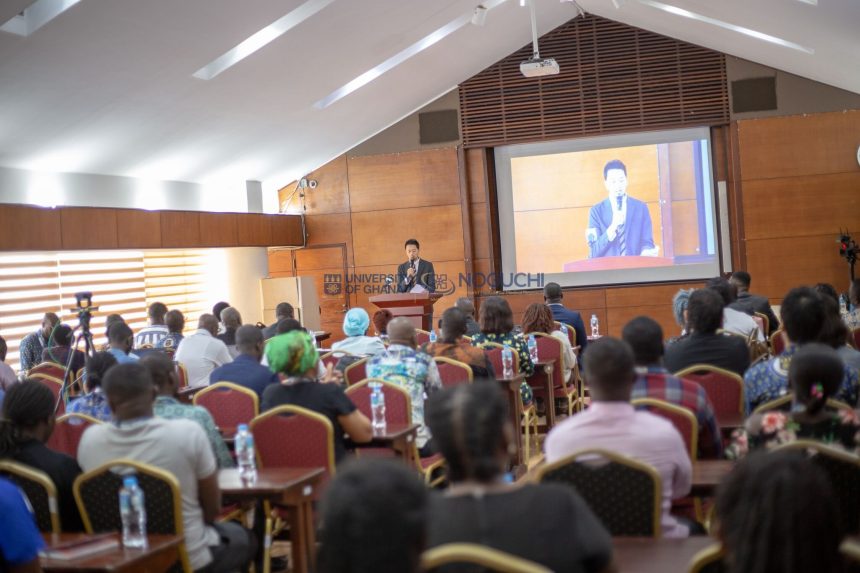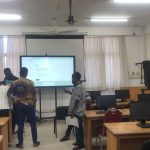The World Health Organization(WHO) has reaffirmed its commitment to supporting the Noguchi Memorial Institute for Medical Research (NMIMR), for its initiative to strengthen lab capacity in the interest of global health security.
This development follows the Institute’s collaboration with the Japan International Cooperation Agency (JICA) to provide a comprehensive and in-depth laboratory based training program in modern diagnostic techniques and preparedness for disease outbreaks.
Speaking at the opening ceremony of the Third Country Training Course on ‘Enhancing Laboratory Skills For Infectious Diseases In West African Countries’, the National Professional Officer of Infectious Hazard Management at the World Health Organization, Mr. Patrick Amevor highlighted some of the ways the WHO has partnered with Noguchi in fighting diseases in Africa over the years. To this, Mr. Amevor reiterated the WHO’s support to the NMIMR.
“Over the years, the WHO has partnered with the NMIMR on several fronts including a polio surveillance; WHO has also accredited a National Influenza Centre, which is hosted right here at Noguchi. It is worth mentioning that during the COVID-19 pandemic, when disease it was at its height, the WHO selected the NMIMR and partnered with it to be a hub for genomic surveillance for the whole of the West African sub region.”
Mr. Amevor was confident in the effectiveness of the in-depth laboratory based training program in helping make the desired health impacts in African region.
“I am very confident therefore that there is more than enough capacity in-house to provide the necessary training for these countries and I have no doubt that this intensive eight weeks training for lab technicians from the selected West African countries will make the desired impact in the sub region.”
“I wish to reaffirm once again the WHO’s commitment to the NMIMR and its initiative to strengthen lap capacity in the interest of global health security.”
Also speaking at the ceremony, Counselor and Deputy Head of Mission from the Embassy of Japan-Ghana, Mr. Naoki Mitori noted that, Japan will continue to support Ghana and African countries in human resource development.
“It is our pride that named after Japanese doctor Hideyo Noguchi, the NMIMR is playing leading role in medical research not only in Ghana, but also in West Africa as a whole. Under the solid foundation based on Japan’s development assistance, we have been providing Japanese ODA including the Third Country Training program to the government and the people of Ghana and other African countries for many years.”
Chargé d’Affairs from the Embassy of Liberia, Mr. Philip Gadjay INNIS also revealed three ways he believes the training course can help equip health workers in Africa in the fight against infectious diseases.
“Healthcare professionals with advanced skills and knowledge in laboratory diagnostics gained from this program will help other participating countries in at least three ways. That is, the use of latest knowledge and technologies for rapid and accurate diagnosis of infectious diseases which is essential to isolate and treat infected individuals quickly.”
The second is that, it encourage effective surveillance which is key to also tracking the spread of infectious diseases. Lastly, it will contribute to the capacity development of Liberia and participating countries by developing skilled health workforce.”
The Noguchi Memorial Institute for Medical Research (NMIMR) had commenced its Third Country Training course on ‘Enhancing Laboratory Skills for Infectious diseases in West African countries’ in an opening ceremony held at the Noguchi Conference Hall on Monday, 2nd October 2023.
The training course was developed by the Institute in collaboration with the Japan International Cooperation Agency (JICA) to provide a comprehensive and in-depth laboratory-based training program in modern diagnostic techniques and preparedness for disease outbreaks in Africa.
Fifteen trainees were selected from African countries including Ghana, Benin, Burkina Faso, Cote d’Ivoire, Guinea, Liberia, Nigeria, Sierra Leone and Togo, comprising seven females and eight males. The training course will last for eight weeks where participants will be equipped with skills in modern diagnostic techniques and preparedness for disease outbreaks.
–
Story by: John Collins Kaledzie | univers.ug.edu.gh




